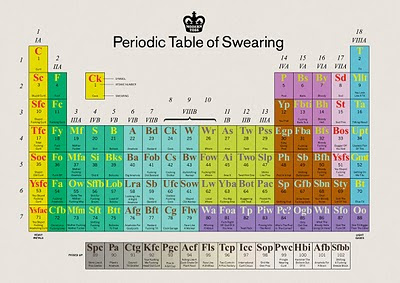7.15.2010 HAVE YOU NO DECENCY?

This article originally appeared in the 7/15/10 issue of Metroland
While sitting around Tuesday afternoon thinking I had nothing to write about, I was alerted to a court decision just handed down by the Second Circuit Court of Appeals declaring the FCC’s punishing of television networks for broadcasting “fleeting expletives” unconstitutional. I’m like “huh? Haven’t we been here before?”
Well, yes we have, sort of. This is a case that’s been bouncing around the upper levels of our court system for a couple years, and we’ve talked about it here a couple of times. And I’ve got a feeling this won’t be the last time, I don’t know. Oh, no.
The case involves George W. Bush’s attempt to turn the FCC into a Christianista strike force, to placate the religious extremists like James Dobson’s Focus on the Family, by trying to cleanse the airwaves of anything remotely un-Christian. As part of this crusade, the FCC dramatically raised penalties and started going after networks and individual stations that aired any “dirty words” on broadcast TV in ways the FCC had never done before. In 2003 the FCC issued around $400,000 in fines; in 2004, the FCC issued over $8 million in fines.
The FCC’s wrath in this case was leveled at a Cher “fuck ‘em”, a Bono “fucking brilliant”, a Nicole Ritchie “cowshit,” a NYPD Blue “bullshit” and an Early Show “bullshitter.” These things all happened in 2002 and 2003.
Oh, we’ve seen this case before. The Second Circuit already determined in 2007, in a thorough and delightfully snarky decision, that the FCC had acted arbitrarily in suddenly changing its standards for indecency, and therefore was in violation of the Administrative Procedure Act, a federal law that governs how agencies like the FCC operate. The Second Circuit didn’t look at the Constitutional dimensions of the FCC’s behavior because it didn’t have to. There’s a axiom in the courts that a Constitutional question should always be avoided if a case can be decided on some other basis, and that’s what the court did. So the 2007 Second Circuit ruling goes to the Supreme Court, which “ruled”, if you call a 5-4 decision with SEVEN separate opinions something resembling “ruling”, that the FCC wasn’t arbitrary at all. Or something. The plurality decision, authored by Justice Anton Scalia, essentially abdicated a big part of the Supreme Court’s responsibility to be a check and balance on the executive branch, at least as far as the regulation of individual speech goes.
In any event, whether or not what the FCC acted constitutionally was still up in the air, and that question came back to the Court of Appeals, which ruled this week that the “standards” now applied by the FCC for indecency on broadcast TV are unconstitutionally vague.
The 32-page decision is a good read. It’s authored by Judge Rosemary Pooler, who also wrote the wonderful first decision back in 2007. A good part of it is explaining to Justice Scalia exactly how he got it so pathetically wrong in the 2009 decision and lays down the gauntlet for why the Bush FCC’s actions were so bumbling, so deplorable, and why the freedom of speech is so sancrosanct.
Here’s some highlights:
Why the 1978 Supreme Court ruling in the George Carlin “seven words you can’t say on television” case is probably no longer relevant:
[W]e face a media landscape that would have been almost unrecognizable in 1978. Cable television was still in its infancy. The Internet was a project run out of the Department of Defense with several hundred users. Not only did Youtube, Facebook, and Twitter not exist, but their founders were either still in diapers or not yet conceived.
Examples of how the FCC’s current standards are impossibly vague:
For instance, while the FCC concluded that “bullshit” in a “NYPD Blue” episode was patently offensive, it concluded that “dick” and “dickhead” were not.... Other expletives such as “pissed off,” “up yours,” “kiss my ass,” and “wiping his ass” were also not found to be patently offensive... This hardly gives broadcasters notice of how the Commission will apply the factors [regarding indecency] in the future.
On the basic futility of trying to regulate speech:
The observation that people will always find a way to subvert censorship laws may expose a certain futility in the FCC’s crusade against indecent speech, but it does not provide a justification for implementing a vague, indiscernible standard. If the FCC cannot anticipate what will be considered indecent under its policy, then it can hardly expect broadcasters to do so.
Pooler’s use of the word “crusade” was revealing, because what the FCC attempted in the Bush years was just that. The fundamental point is that when a speech regulation is vague, speakers will self-censor to an extreme degree to avoid being penalized, to society’s detriment, and the Court provided a bunch of examples of how this is already happening.
One wonders if Obama’s FCC will take this back up to the Supreme Court, and if they do, why? The Supreme Court, as presently constituted, has proven itself incompetent to deal with issues regarding our fundamental freedoms. Unless, of course, you’re a corporation or consider carrying a gun around a fundamental freedom.

0 Comments:
Post a Comment
<< Home